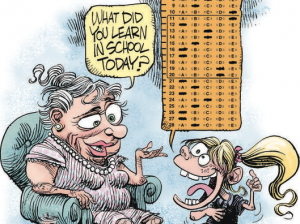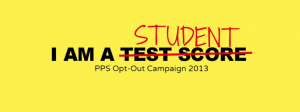Synthesis
Recently the United States has seen protests, primarily by students, teachers, parents and organized groups, opposed to school privatization, opposition of the federal government’s overreaching control in the establishment of curriculums, and advocates wanting to eliminate high-stakes testing.22 Each of these groups is using different strategies to voice their opinions. The teachers and students that are opposed to high-stakes testing are using a more passive approach by refusing to take the tests, while those against the privatization of schools are marching to the White House.22 In addition, professional lobbyists are infiltrating hearings at the Capitol.22 Two practitioner-oriented articles provide information pertaining to strategies that can be employed by those opposed to high-stakes testing: “Rifts Deepen Over Direction of Education Policy in U.S.” by Michele McNeil written in 2013, and Karla Scoon Reid’s 2014 article, “Testing Skeptics’ Advice: Just Say ‘No.’ ”
The McNeil article delves into the protestors opposed to high-stakes testing. She sees the majority of the people who are against these tests being teachers, students and parents.22 These groups are voicing their opinion about the test by refusing to take and distribute the tests, even if they are mandatory.22 For instance, during this year’s testing period, teachers in Seattle high schools decided collectively to not distribute the tests.22 Another protest involved a coalition of parents, teachers, students and organized groups joining together and dressing up as zombies as a way to protest the tests.22 The zombies were indicative of the death of the educational system and the impact that the tests have on the students who are being forced to take them as a measurement of their abilities.22
The Reid article focuses on the strategy of opting out that organizations opposed to high-stakes testing are spreading to parents. Opting out is when parents refuse to allow their children to take the high-stakes tests. The point of this type of protest is to get a large number of people to follow along in order to draw the attention of policymakers to change the law surrounding these tests.23 Recently, the push toward opting out resulted in high-profile boycotts and the establishment of meetings in the large school districts of cities, such as Chicago.23 For instance, two teachers in Chicago refused to hand out the tests to their students and will be facing disciplinary action.23 Opting out has also resulted in problems, because only some states in the country have created guidelines pertaining to parents’ and children’s rights to refuse to take the tests.23 For example, in California, parents have to opt their children out of the test, while in Illinois and New York, the children must decide to not take the test, as the parents do not have a say in the matter; however, to indicate they are against the test, some parents have their children wear signs on their shirts stating, “I refuse.”23
In conclusion, both of these articles address the sheer number of people who are opposed to high stakes testing and strategies such as opting out of the test. Despite the coalitions of parents, students, teachers and organizations working to stop high-stakes testing in public schools, there is a larger issue here, which is that, under the “No Child Left Behind” (NCLB), policy, each school must have at least 95% of its students take the test, and any school that fails to meet this policy will be justification for academic intervention.22&23 If a school is under academic intervention and does not have Title one funds, their punishment is under state jurisdiction, however for the schools that rely on those funds, they could be required to inform the public, create an improvement plan or allow students to transfer.22&23 Either way, the students, school and administration suffer.
32
 33
33
Links
Rifts Deepen Over Direction of Education Policy in U.S. by Michele McNeil22
Testing Skeptics’ Advice: Just Say ‘No’ by Karla Scoon Reid23
Warning: Links may not work if you are not a subscriber to the academic journal

